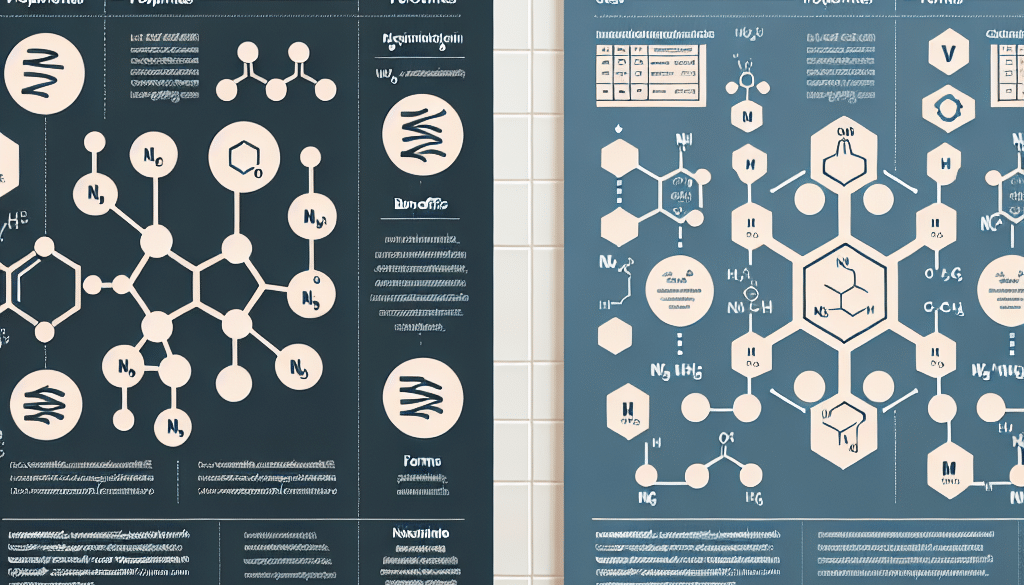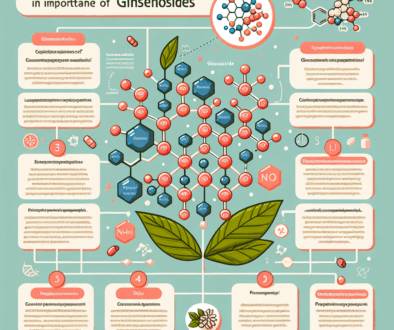Nicotinamide Mononucleotide vs Niacinamide: Guide
-
Table of Contents
- Nicotinamide Mononucleotide vs Niacinamide: Comprehensive Guide
- Understanding Nicotinamide Mononucleotide (NMN)
- Exploring Niacinamide
- Comparing NMN and Niacinamide
- Biological Functions
- Health Benefits
- Research and Studies
- Latest Research on NMN and Niacinamide
- NMN Research Highlights
- Niacinamide Research Highlights
- Choosing Between NMN and Niacinamide
- Conclusion: Key Takeaways
- Discover ETprotein’s Protein Products
Nicotinamide Mononucleotide vs Niacinamide: Comprehensive Guide

When it comes to maintaining good health and slowing down the aging process, the scientific community has been buzzing about the potential benefits of certain vitamins and their derivatives. Two compounds that have garnered significant attention are Nicotinamide Mononucleotide (NMN) and Niacinamide, also known as Nicotinamide. While both are related to Vitamin B3 and play roles in cellular metabolism, they have distinct differences that are important to understand. This guide will delve into the science behind NMN and Niacinamide, comparing their benefits, uses, and the latest research findings.
Understanding Nicotinamide Mononucleotide (NMN)
Nicotinamide Mononucleotide is a nucleotide derived from ribose and nicotinamide. It is a precursor to Nicotinamide Adenine Dinucleotide (NAD+), a vital coenzyme found in all living cells that is essential for fundamental biological processes.
- Role in Cellular Health: NMN plays a crucial role in the production of NAD+, which is involved in DNA repair, energy production, and regulating circadian rhythms.
- Anti-Aging Potential: Research suggests that NMN can enhance longevity by boosting NAD+ levels, which tend to decline with age.
- Scientific Studies: Animal studies have shown promising results, such as improved insulin sensitivity, enhanced physical performance, and better mitochondrial function.
Exploring Niacinamide
Niacinamide, also known as Nicotinamide, is a form of Vitamin B3 that is found in food and used as a dietary supplement and medication. It is an amide of nicotinic acid and has several health benefits.
- Skin Health: Niacinamide is widely recognized for its skin benefits, including reducing inflammation, treating acne, and protecting against sun damage.
- Cholesterol Management: It can help regulate cholesterol levels and reduce cardiovascular risks.
- Neurological Effects: Niacinamide has been studied for its potential neuroprotective effects and its role in preventing certain neurodegenerative diseases.
Comparing NMN and Niacinamide
While NMN and Niacinamide are related, they serve different functions in the body and have unique benefits. Here’s a closer look at how they compare:
Biological Functions
NMN is primarily involved in the synthesis of NAD+, which is crucial for energy metabolism and maintaining cellular health. Niacinamide, on the other hand, is a form of Vitamin B3 that can be directly utilized by the body to support skin health, DNA repair, and overall metabolism.
Health Benefits
The potential health benefits of NMN are mostly related to its ability to increase NAD+ levels, which may slow aging and improve metabolic functions. Niacinamide is known for its skin benefits, cholesterol management, and possible neuroprotective properties.
Research and Studies
Most of the research on NMN has been conducted on animals, with human studies only recently emerging. Niacinamide has been extensively studied in humans, with a wealth of data supporting its safety and efficacy for various health conditions.
Latest Research on NMN and Niacinamide
Scientific research is ongoing to further understand the full potential of NMN and Niacinamide. Recent studies have explored their effects on aging, metabolic health, and disease prevention.
NMN Research Highlights
- A study on mice found that NMN supplementation could reverse age-related arterial dysfunction, suggesting potential cardiovascular benefits.
- Research on humans has begun to investigate the safety and metabolic effects of NMN, with preliminary results showing promise.
Niacinamide Research Highlights
- Clinical trials have demonstrated that Niacinamide can improve skin appearance, reduce fine lines and wrinkles, and improve skin elasticity.
- Studies have also shown that Niacinamide can help treat acne and reduce hyperpigmentation.
Choosing Between NMN and Niacinamide
When deciding between NMN and Niacinamide, consider your health goals and consult with a healthcare professional. NMN may be more suitable for those interested in anti-aging and metabolic health, while Niacinamide is a proven option for skin health and certain medical conditions.
Conclusion: Key Takeaways
Nicotinamide Mononucleotide and Niacinamide are both valuable compounds with distinct health benefits. NMN shows potential in anti-aging and metabolic health, while Niacinamide is beneficial for skin health, cholesterol management, and neuroprotection. Ongoing research continues to uncover the full scope of their effects on human health.
Discover ETprotein’s Protein Products
If you’re looking to enhance your health regimen, consider exploring ETprotein’s range of high-quality protein products. Their offerings include a variety of organic and non-GMO protein powders that cater to different dietary needs and preferences. ETprotein’s commitment to purity and quality makes them a trusted choice for consumers seeking to support their health and wellness goals.
About ETprotein:
ETprotein, a reputable protein and L-(+)-Ergothioneine (EGT) Chinese factory manufacturer and supplier, is renowned for producing, stocking, exporting, and delivering the highest quality organic bulk vegan proteins and L-(+)-Ergothioneine. They include Organic rice protein, clear rice protein, pea protein, clear pea protein, watermelon seed protein, pumpkin seed protein, sunflower seed protein, mung bean protein, peanut protein, and L-(+)-Ergothioneine EGT Pharmaceutical grade, L-(+)-Ergothioneine EGT food grade, L-(+)-Ergothioneine EGT cosmetic grade, L-(+)-Ergothioneine EGT reference grade and L-(+)-Ergothioneine EGT standard. Their offerings, characterized by a neutral taste, non-GMO, allergen-free attributes, with L-(+)-Ergothioneine purity over 98%, 99%, cater to a diverse range of industries. They serve nutraceutical, pharmaceutical, cosmeceutical, veterinary, as well as food and beverage finished product distributors, traders, and manufacturers across Europe, USA, Canada, Australia, Thailand, Japan, Korea, Brazil, and Chile, among others.
ETprotein specialization includes exporting and delivering tailor-made protein powder and finished nutritional supplements. Their extensive product range covers sectors like Food and Beverage, Sports Nutrition, Weight Management, Dietary Supplements, Health and Wellness Products, and Infant Formula, ensuring comprehensive solutions to meet all your protein needs.
As a trusted company by leading global food and beverage brands and Fortune 500 companies, ETprotein reinforces China’s reputation in the global arena. For more information or to sample their products, please contact them and email sales(at)ETprotein.com today.












